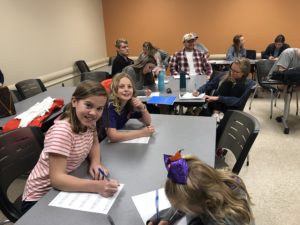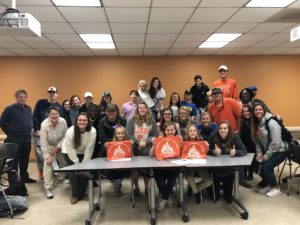Clemson’s Outdoor Lab counsellors have taken their camp activities online to help campers continue to experience the joy of camp while also following the state’s social distancing requirements.
The lab offers several camp programs, including the Jaycee Camp Hope which serves people between ages eight to more than 60 years of age, with many of their campers having cognitive disabilities. Typically, the camp provides a series of daily activities that help campers develop independence as they learn to do things for themselves, including swimming, canoeing, fishing, drama, archery, crafts, pontoon boat rides, nature activities and overnight campouts.

Lab Intern Abreigh Youngblood, who is also a genetics major at Clemson, has been coordinating many of the camp’s virtual activities with her fellow counsellors while also leading some sessions herself. She says that the closure of the Clemson University campus, including the Outdoor Lab, has led them to find creative new ways to deliver camp programming during an unprecedented time when it’s most needed.
“We wanted to give our campers, who we love dearly, a taste of camp at a time when most of their normal activities are cancelled,” Youngblood said. “This gives them something to look forward to throughout the week and is a huge benefit to those of us who miss our campers. It’s awesome to see everyone’s smiles while we do something we enjoy together.”
The lab arranges several different activities once or twice a week. One of their camp counselors will volunteer to lead a specific activity and set up a Zoom meeting. They then send their campers the link and instructions about what they may need to in order to participate, such as an ingredient list for baking or supplies for a craft project.
So far, they’ve hosted sessions on everything from playing bingo to baking banana muffins. A typical session is attended by between 15 to 25 campers. Youngblood says the value of the online camp activities keeps revealing itself in different ways.
“These are tough times and it’s wonderful to see how our campers are responding to the sessions,” she said. “After a session we sometimes receive photos of the project we completed together – and we’ve all started to look forward to these sessions as much as they do.”
She added that it’s rewarding to see parents and caregivers get involved with the activities, knowing how much it means to their camper. Beth Allen’s daughter regularly attends the Zoom activities. Allen says that the e-camp gives her daughter something to look forward to while she’s safe at home, especially since all of her other activities have come to a halt. The camp sessions also provide a distraction for her daughter while she must be at her job in a hospital and her husband works from home.

“On one of her quiet days she had six Camp Hope Zoom meetings to look forward to and she is loving it,” Allen said. “She also feels very grown up that she has a Zoom meeting like her dad has. These simple activities are making a huge difference in her life right now.”
Leslie Conrad, director of the Clemson’s Outdoor Lab, said she’s been thrilled to see her counsellors’ creativity and ingenuity shine over the past few weeks, and is certain that the virtual camp activities are helping her and her staff just as much as they’re helping campers.
“Our campers are some of the most real and genuine people you will ever meet, so being able to ‘see’ them and interact with them during this time is very encouraging,” Conrad said. “We’re delighted to keep bringing a part of camp into their homes.”
###
Visit the Clemson Outdoor Lab website for details about its summer programs, including opportunities for family-friendly getaways during the summer.


